Ethical Violations in ICT: An Analysis of the ACS Code of Conduct
VerifiedAdded on 2022/09/08
|8
|1784
|43
Report
AI Summary
This report examines the Australian Computer Society (ACS) Code of Conduct, focusing on ethical breaches within the ICT industry. The report analyzes a case scenario where ICT professionals compromise data security for faster product delivery, violating the principle of prioritizing public interest over personal or business gains. It discusses the implications of these ethical violations, including potential data breaches and the erosion of public trust. The report identifies specific breaches of the ACS Code of Conduct, emphasizing the importance of data encryption and adherence to professional standards. Furthermore, it explores the impact of ICT advancements on ethical considerations, the need for ethical decision-making, and provides recommendations for resolving ethical issues. The report concludes by highlighting the significance of upholding the ACS Code of Conduct, especially the 'Primacy of the Public Interest,' and the role of professionalism in ensuring ethical conduct within the ICT sector. The report references relevant sources to support its analysis and findings.
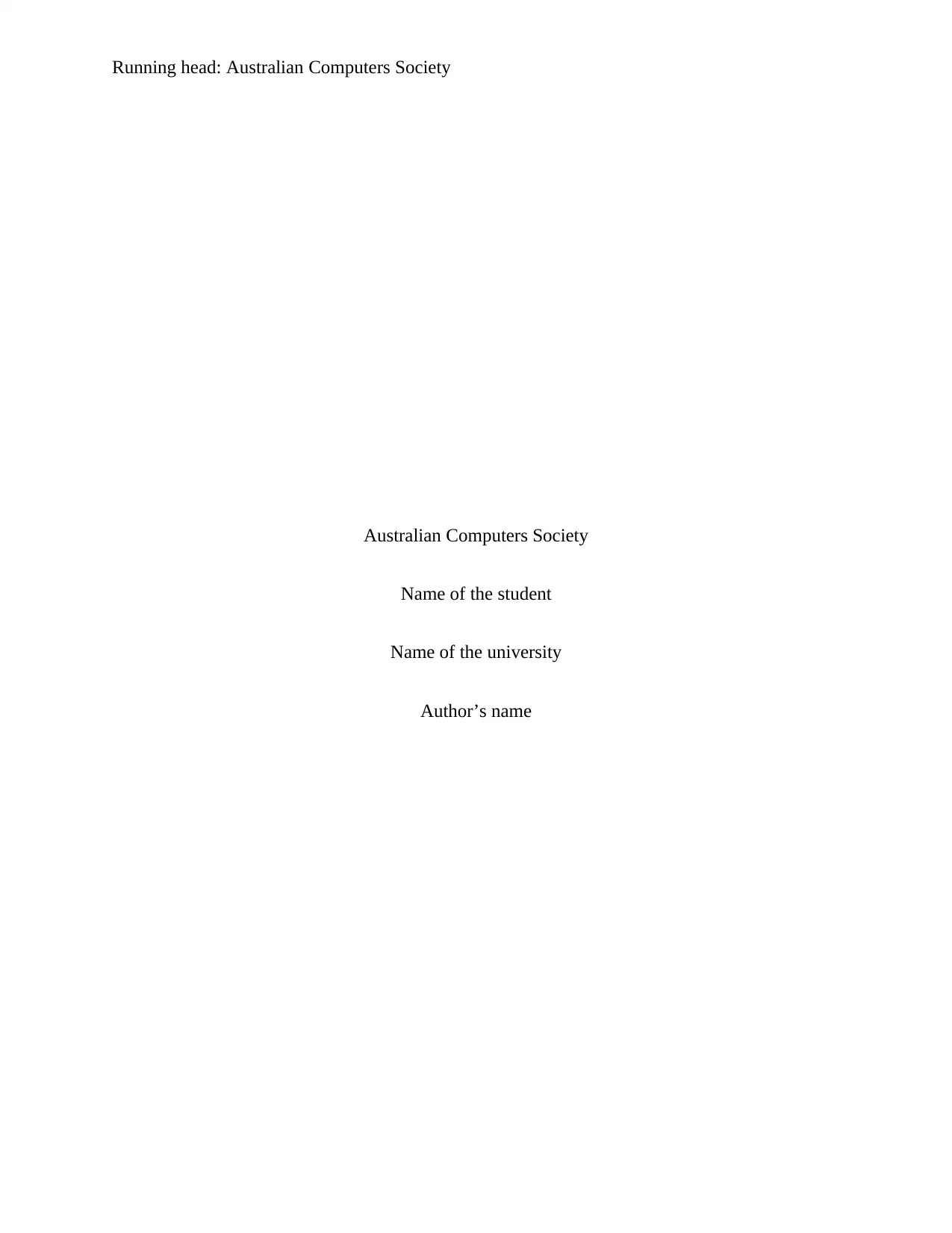
Running head: Australian Computers Society
Australian Computers Society
Name of the student
Name of the university
Author’s name
Australian Computers Society
Name of the student
Name of the university
Author’s name
Paraphrase This Document
Need a fresh take? Get an instant paraphrase of this document with our AI Paraphraser
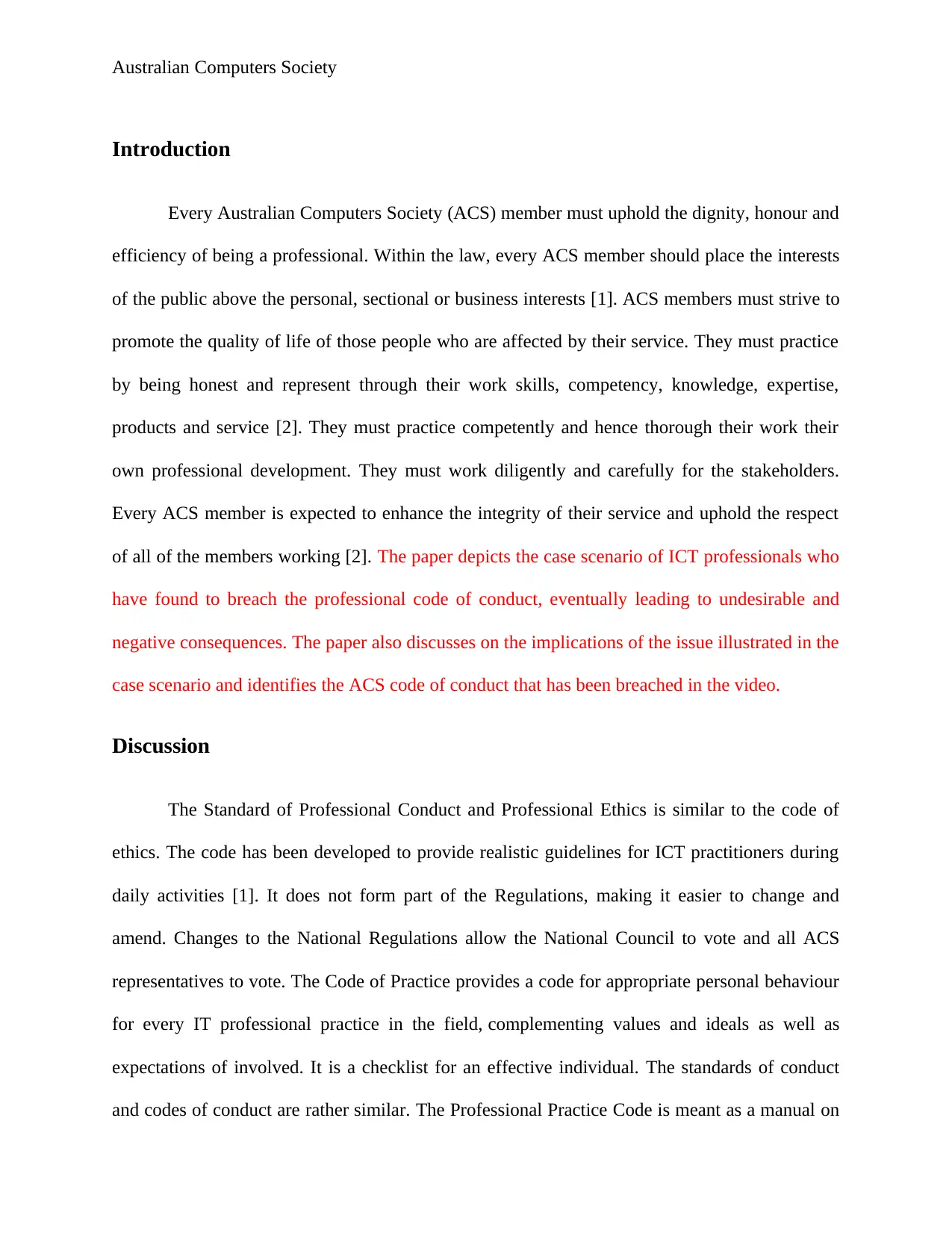
Australian Computers Society
Introduction
Every Australian Computers Society (ACS) member must uphold the dignity, honour and
efficiency of being a professional. Within the law, every ACS member should place the interests
of the public above the personal, sectional or business interests [1]. ACS members must strive to
promote the quality of life of those people who are affected by their service. They must practice
by being honest and represent through their work skills, competency, knowledge, expertise,
products and service [2]. They must practice competently and hence thorough their work their
own professional development. They must work diligently and carefully for the stakeholders.
Every ACS member is expected to enhance the integrity of their service and uphold the respect
of all of the members working [2]. The paper depicts the case scenario of ICT professionals who
have found to breach the professional code of conduct, eventually leading to undesirable and
negative consequences. The paper also discusses on the implications of the issue illustrated in the
case scenario and identifies the ACS code of conduct that has been breached in the video.
Discussion
The Standard of Professional Conduct and Professional Ethics is similar to the code of
ethics. The code has been developed to provide realistic guidelines for ICT practitioners during
daily activities [1]. It does not form part of the Regulations, making it easier to change and
amend. Changes to the National Regulations allow the National Council to vote and all ACS
representatives to vote. The Code of Practice provides a code for appropriate personal behaviour
for every IT professional practice in the field, complementing values and ideals as well as
expectations of involved. It is a checklist for an effective individual. The standards of conduct
and codes of conduct are rather similar. The Professional Practice Code is meant as a manual on
Introduction
Every Australian Computers Society (ACS) member must uphold the dignity, honour and
efficiency of being a professional. Within the law, every ACS member should place the interests
of the public above the personal, sectional or business interests [1]. ACS members must strive to
promote the quality of life of those people who are affected by their service. They must practice
by being honest and represent through their work skills, competency, knowledge, expertise,
products and service [2]. They must practice competently and hence thorough their work their
own professional development. They must work diligently and carefully for the stakeholders.
Every ACS member is expected to enhance the integrity of their service and uphold the respect
of all of the members working [2]. The paper depicts the case scenario of ICT professionals who
have found to breach the professional code of conduct, eventually leading to undesirable and
negative consequences. The paper also discusses on the implications of the issue illustrated in the
case scenario and identifies the ACS code of conduct that has been breached in the video.
Discussion
The Standard of Professional Conduct and Professional Ethics is similar to the code of
ethics. The code has been developed to provide realistic guidelines for ICT practitioners during
daily activities [1]. It does not form part of the Regulations, making it easier to change and
amend. Changes to the National Regulations allow the National Council to vote and all ACS
representatives to vote. The Code of Practice provides a code for appropriate personal behaviour
for every IT professional practice in the field, complementing values and ideals as well as
expectations of involved. It is a checklist for an effective individual. The standards of conduct
and codes of conduct are rather similar. The Professional Practice Code is meant as a manual on
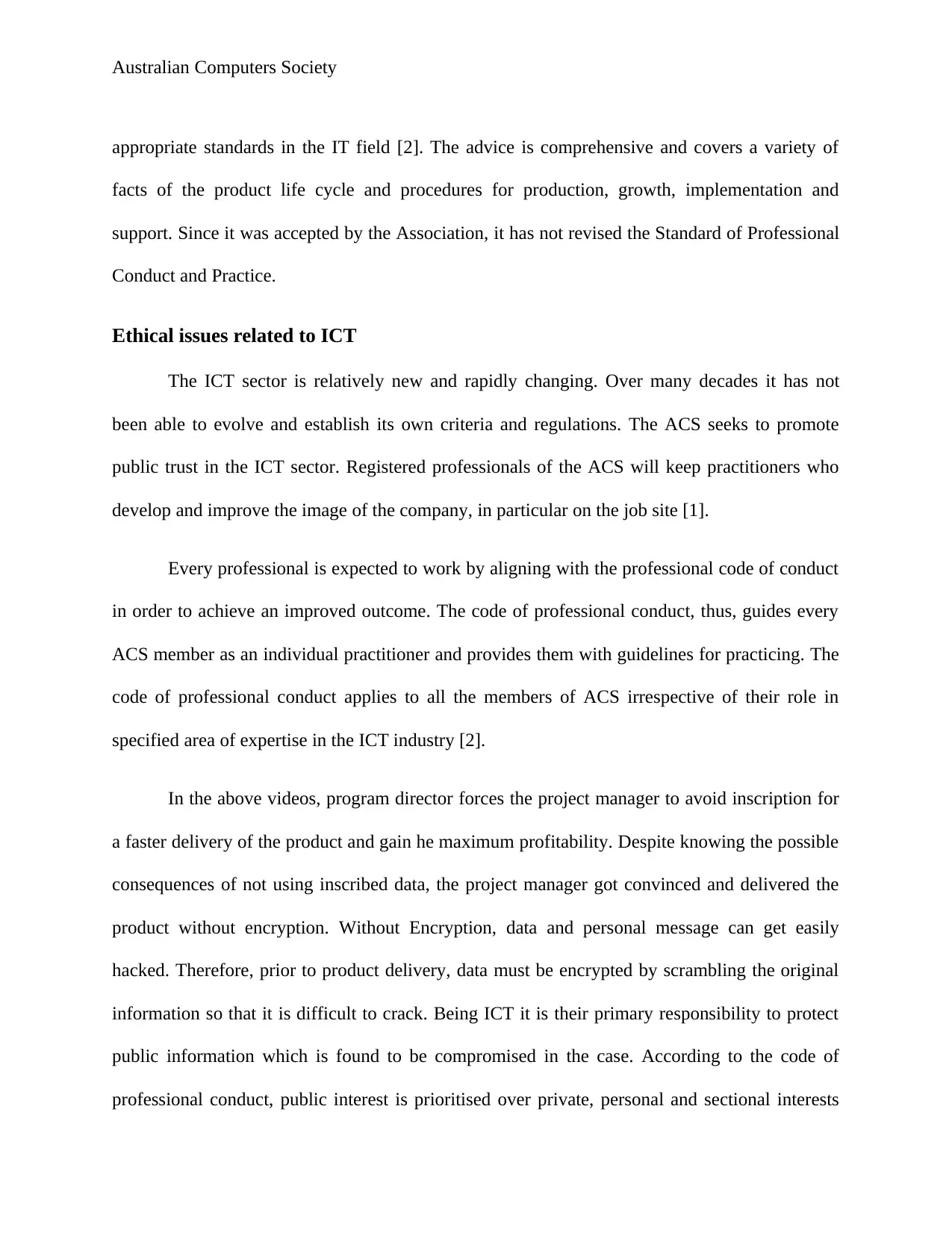
Australian Computers Society
appropriate standards in the IT field [2]. The advice is comprehensive and covers a variety of
facts of the product life cycle and procedures for production, growth, implementation and
support. Since it was accepted by the Association, it has not revised the Standard of Professional
Conduct and Practice.
Ethical issues related to ICT
The ICT sector is relatively new and rapidly changing. Over many decades it has not
been able to evolve and establish its own criteria and regulations. The ACS seeks to promote
public trust in the ICT sector. Registered professionals of the ACS will keep practitioners who
develop and improve the image of the company, in particular on the job site [1].
Every professional is expected to work by aligning with the professional code of conduct
in order to achieve an improved outcome. The code of professional conduct, thus, guides every
ACS member as an individual practitioner and provides them with guidelines for practicing. The
code of professional conduct applies to all the members of ACS irrespective of their role in
specified area of expertise in the ICT industry [2].
In the above videos, program director forces the project manager to avoid inscription for
a faster delivery of the product and gain he maximum profitability. Despite knowing the possible
consequences of not using inscribed data, the project manager got convinced and delivered the
product without encryption. Without Encryption, data and personal message can get easily
hacked. Therefore, prior to product delivery, data must be encrypted by scrambling the original
information so that it is difficult to crack. Being ICT it is their primary responsibility to protect
public information which is found to be compromised in the case. According to the code of
professional conduct, public interest is prioritised over private, personal and sectional interests
appropriate standards in the IT field [2]. The advice is comprehensive and covers a variety of
facts of the product life cycle and procedures for production, growth, implementation and
support. Since it was accepted by the Association, it has not revised the Standard of Professional
Conduct and Practice.
Ethical issues related to ICT
The ICT sector is relatively new and rapidly changing. Over many decades it has not
been able to evolve and establish its own criteria and regulations. The ACS seeks to promote
public trust in the ICT sector. Registered professionals of the ACS will keep practitioners who
develop and improve the image of the company, in particular on the job site [1].
Every professional is expected to work by aligning with the professional code of conduct
in order to achieve an improved outcome. The code of professional conduct, thus, guides every
ACS member as an individual practitioner and provides them with guidelines for practicing. The
code of professional conduct applies to all the members of ACS irrespective of their role in
specified area of expertise in the ICT industry [2].
In the above videos, program director forces the project manager to avoid inscription for
a faster delivery of the product and gain he maximum profitability. Despite knowing the possible
consequences of not using inscribed data, the project manager got convinced and delivered the
product without encryption. Without Encryption, data and personal message can get easily
hacked. Therefore, prior to product delivery, data must be encrypted by scrambling the original
information so that it is difficult to crack. Being ICT it is their primary responsibility to protect
public information which is found to be compromised in the case. According to the code of
professional conduct, public interest is prioritised over private, personal and sectional interests
⊘ This is a preview!⊘
Do you want full access?
Subscribe today to unlock all pages.

Trusted by 1+ million students worldwide
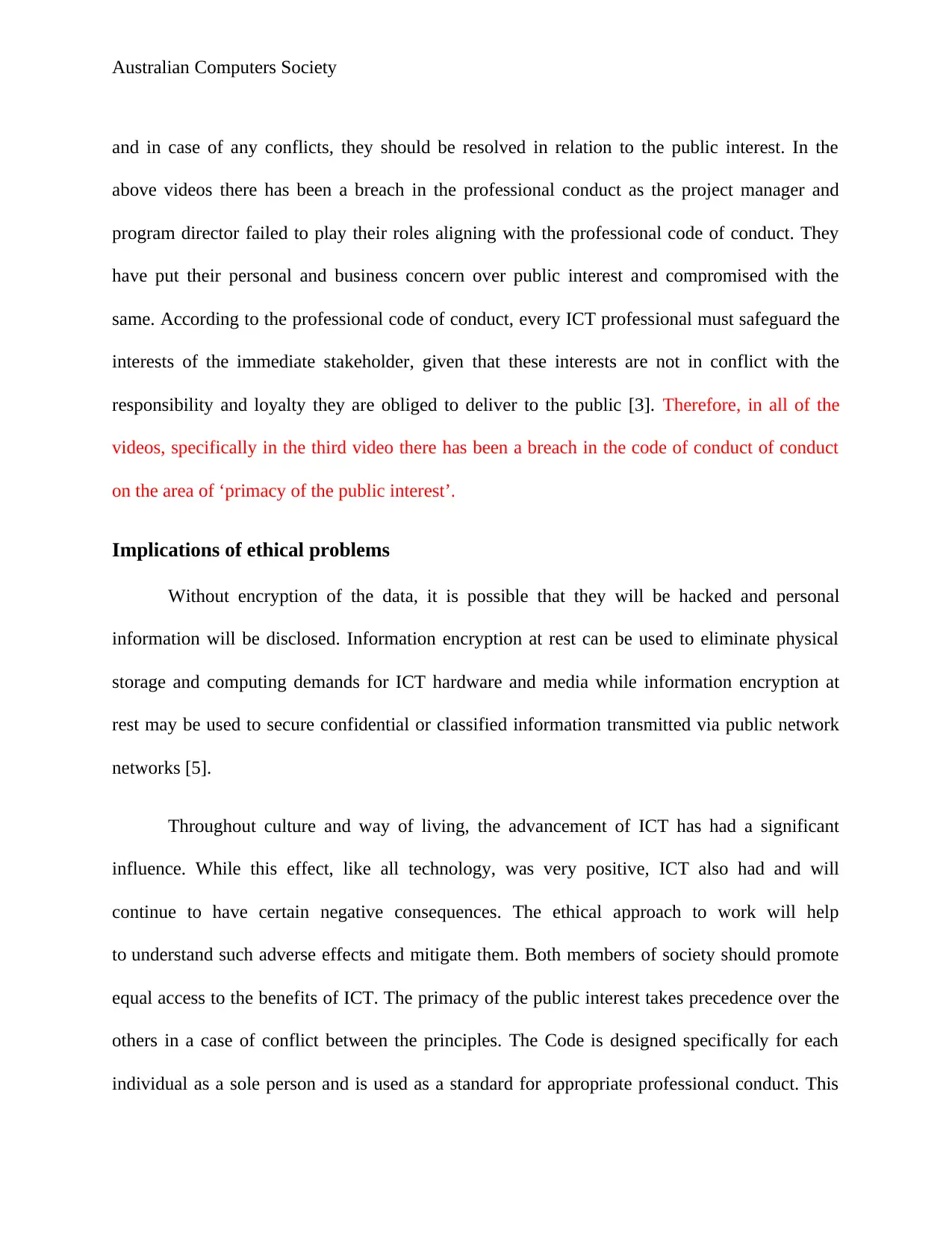
Australian Computers Society
and in case of any conflicts, they should be resolved in relation to the public interest. In the
above videos there has been a breach in the professional conduct as the project manager and
program director failed to play their roles aligning with the professional code of conduct. They
have put their personal and business concern over public interest and compromised with the
same. According to the professional code of conduct, every ICT professional must safeguard the
interests of the immediate stakeholder, given that these interests are not in conflict with the
responsibility and loyalty they are obliged to deliver to the public [3]. Therefore, in all of the
videos, specifically in the third video there has been a breach in the code of conduct of conduct
on the area of ‘primacy of the public interest’.
Implications of ethical problems
Without encryption of the data, it is possible that they will be hacked and personal
information will be disclosed. Information encryption at rest can be used to eliminate physical
storage and computing demands for ICT hardware and media while information encryption at
rest may be used to secure confidential or classified information transmitted via public network
networks [5].
Throughout culture and way of living, the advancement of ICT has had a significant
influence. While this effect, like all technology, was very positive, ICT also had and will
continue to have certain negative consequences. The ethical approach to work will help
to understand such adverse effects and mitigate them. Both members of society should promote
equal access to the benefits of ICT. The primacy of the public interest takes precedence over the
others in a case of conflict between the principles. The Code is designed specifically for each
individual as a sole person and is used as a standard for appropriate professional conduct. This
and in case of any conflicts, they should be resolved in relation to the public interest. In the
above videos there has been a breach in the professional conduct as the project manager and
program director failed to play their roles aligning with the professional code of conduct. They
have put their personal and business concern over public interest and compromised with the
same. According to the professional code of conduct, every ICT professional must safeguard the
interests of the immediate stakeholder, given that these interests are not in conflict with the
responsibility and loyalty they are obliged to deliver to the public [3]. Therefore, in all of the
videos, specifically in the third video there has been a breach in the code of conduct of conduct
on the area of ‘primacy of the public interest’.
Implications of ethical problems
Without encryption of the data, it is possible that they will be hacked and personal
information will be disclosed. Information encryption at rest can be used to eliminate physical
storage and computing demands for ICT hardware and media while information encryption at
rest may be used to secure confidential or classified information transmitted via public network
networks [5].
Throughout culture and way of living, the advancement of ICT has had a significant
influence. While this effect, like all technology, was very positive, ICT also had and will
continue to have certain negative consequences. The ethical approach to work will help
to understand such adverse effects and mitigate them. Both members of society should promote
equal access to the benefits of ICT. The primacy of the public interest takes precedence over the
others in a case of conflict between the principles. The Code is designed specifically for each
individual as a sole person and is used as a standard for appropriate professional conduct. This
Paraphrase This Document
Need a fresh take? Get an instant paraphrase of this document with our AI Paraphraser
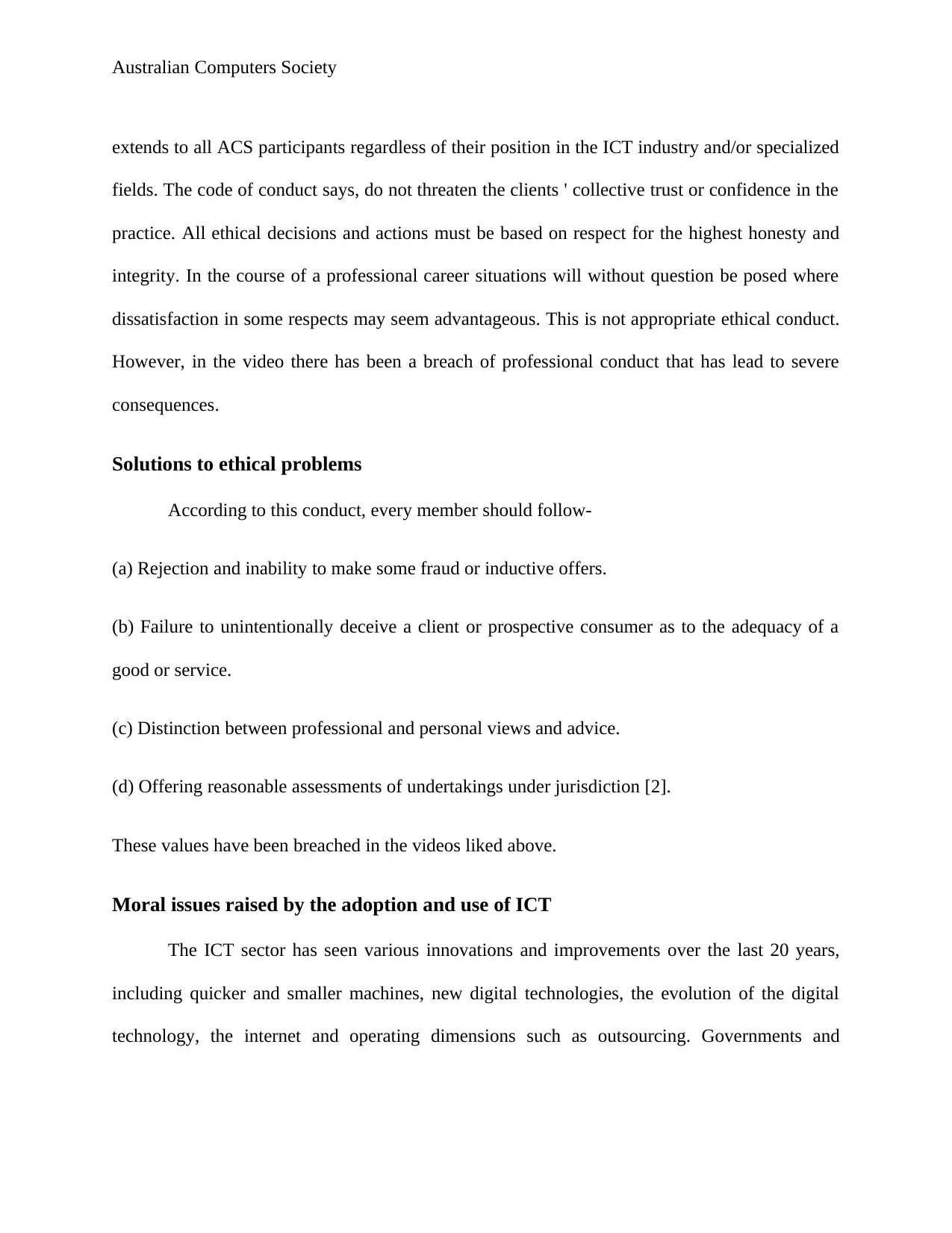
Australian Computers Society
extends to all ACS participants regardless of their position in the ICT industry and/or specialized
fields. The code of conduct says, do not threaten the clients ' collective trust or confidence in the
practice. All ethical decisions and actions must be based on respect for the highest honesty and
integrity. In the course of a professional career situations will without question be posed where
dissatisfaction in some respects may seem advantageous. This is not appropriate ethical conduct.
However, in the video there has been a breach of professional conduct that has lead to severe
consequences.
Solutions to ethical problems
According to this conduct, every member should follow-
(a) Rejection and inability to make some fraud or inductive offers.
(b) Failure to unintentionally deceive a client or prospective consumer as to the adequacy of a
good or service.
(c) Distinction between professional and personal views and advice.
(d) Offering reasonable assessments of undertakings under jurisdiction [2].
These values have been breached in the videos liked above.
Moral issues raised by the adoption and use of ICT
The ICT sector has seen various innovations and improvements over the last 20 years,
including quicker and smaller machines, new digital technologies, the evolution of the digital
technology, the internet and operating dimensions such as outsourcing. Governments and
extends to all ACS participants regardless of their position in the ICT industry and/or specialized
fields. The code of conduct says, do not threaten the clients ' collective trust or confidence in the
practice. All ethical decisions and actions must be based on respect for the highest honesty and
integrity. In the course of a professional career situations will without question be posed where
dissatisfaction in some respects may seem advantageous. This is not appropriate ethical conduct.
However, in the video there has been a breach of professional conduct that has lead to severe
consequences.
Solutions to ethical problems
According to this conduct, every member should follow-
(a) Rejection and inability to make some fraud or inductive offers.
(b) Failure to unintentionally deceive a client or prospective consumer as to the adequacy of a
good or service.
(c) Distinction between professional and personal views and advice.
(d) Offering reasonable assessments of undertakings under jurisdiction [2].
These values have been breached in the videos liked above.
Moral issues raised by the adoption and use of ICT
The ICT sector has seen various innovations and improvements over the last 20 years,
including quicker and smaller machines, new digital technologies, the evolution of the digital
technology, the internet and operating dimensions such as outsourcing. Governments and
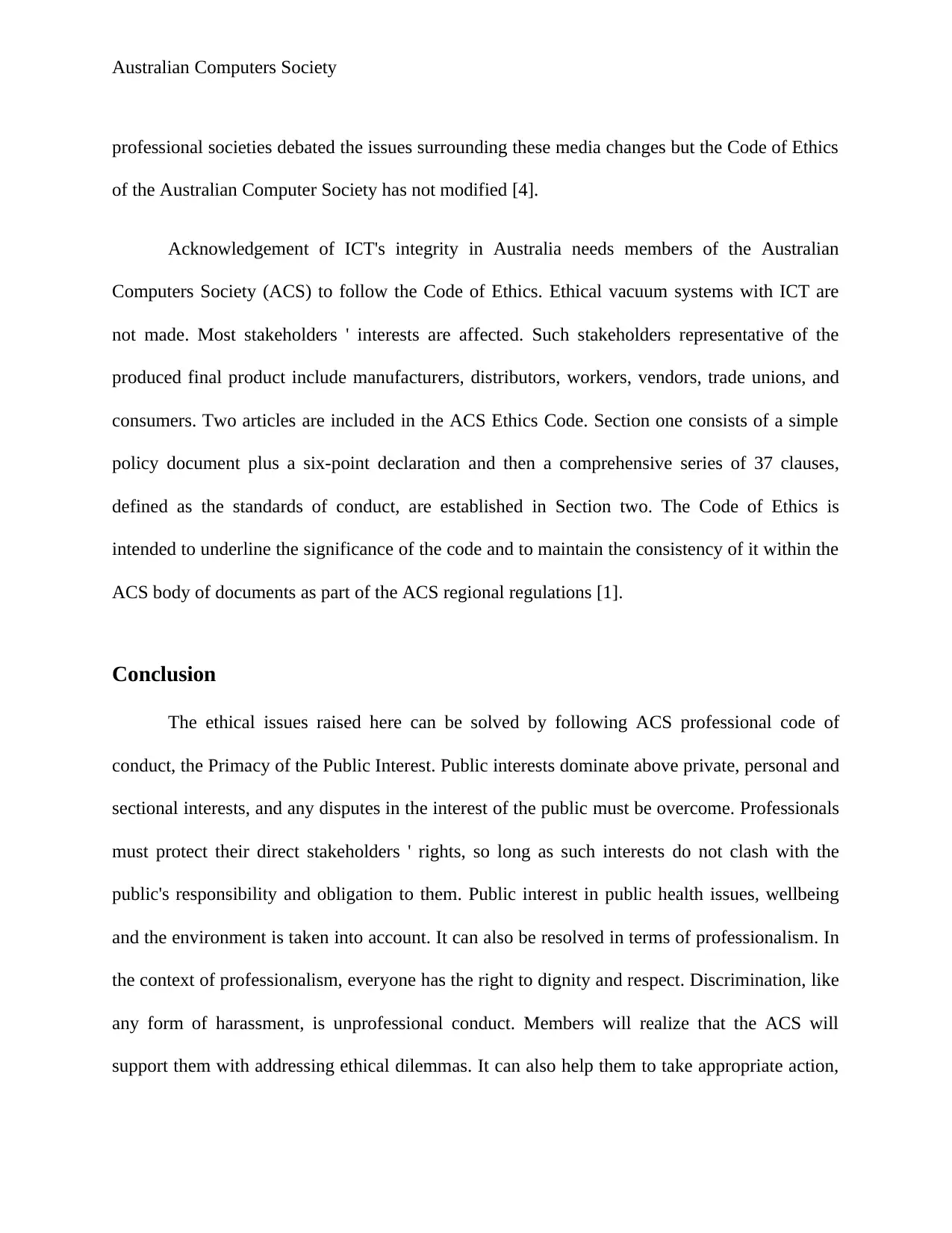
Australian Computers Society
professional societies debated the issues surrounding these media changes but the Code of Ethics
of the Australian Computer Society has not modified [4].
Acknowledgement of ICT's integrity in Australia needs members of the Australian
Computers Society (ACS) to follow the Code of Ethics. Ethical vacuum systems with ICT are
not made. Most stakeholders ' interests are affected. Such stakeholders representative of the
produced final product include manufacturers, distributors, workers, vendors, trade unions, and
consumers. Two articles are included in the ACS Ethics Code. Section one consists of a simple
policy document plus a six-point declaration and then a comprehensive series of 37 clauses,
defined as the standards of conduct, are established in Section two. The Code of Ethics is
intended to underline the significance of the code and to maintain the consistency of it within the
ACS body of documents as part of the ACS regional regulations [1].
Conclusion
The ethical issues raised here can be solved by following ACS professional code of
conduct, the Primacy of the Public Interest. Public interests dominate above private, personal and
sectional interests, and any disputes in the interest of the public must be overcome. Professionals
must protect their direct stakeholders ' rights, so long as such interests do not clash with the
public's responsibility and obligation to them. Public interest in public health issues, wellbeing
and the environment is taken into account. It can also be resolved in terms of professionalism. In
the context of professionalism, everyone has the right to dignity and respect. Discrimination, like
any form of harassment, is unprofessional conduct. Members will realize that the ACS will
support them with addressing ethical dilemmas. It can also help them to take appropriate action,
professional societies debated the issues surrounding these media changes but the Code of Ethics
of the Australian Computer Society has not modified [4].
Acknowledgement of ICT's integrity in Australia needs members of the Australian
Computers Society (ACS) to follow the Code of Ethics. Ethical vacuum systems with ICT are
not made. Most stakeholders ' interests are affected. Such stakeholders representative of the
produced final product include manufacturers, distributors, workers, vendors, trade unions, and
consumers. Two articles are included in the ACS Ethics Code. Section one consists of a simple
policy document plus a six-point declaration and then a comprehensive series of 37 clauses,
defined as the standards of conduct, are established in Section two. The Code of Ethics is
intended to underline the significance of the code and to maintain the consistency of it within the
ACS body of documents as part of the ACS regional regulations [1].
Conclusion
The ethical issues raised here can be solved by following ACS professional code of
conduct, the Primacy of the Public Interest. Public interests dominate above private, personal and
sectional interests, and any disputes in the interest of the public must be overcome. Professionals
must protect their direct stakeholders ' rights, so long as such interests do not clash with the
public's responsibility and obligation to them. Public interest in public health issues, wellbeing
and the environment is taken into account. It can also be resolved in terms of professionalism. In
the context of professionalism, everyone has the right to dignity and respect. Discrimination, like
any form of harassment, is unprofessional conduct. Members will realize that the ACS will
support them with addressing ethical dilemmas. It can also help them to take appropriate action,
⊘ This is a preview!⊘
Do you want full access?
Subscribe today to unlock all pages.

Trusted by 1+ million students worldwide
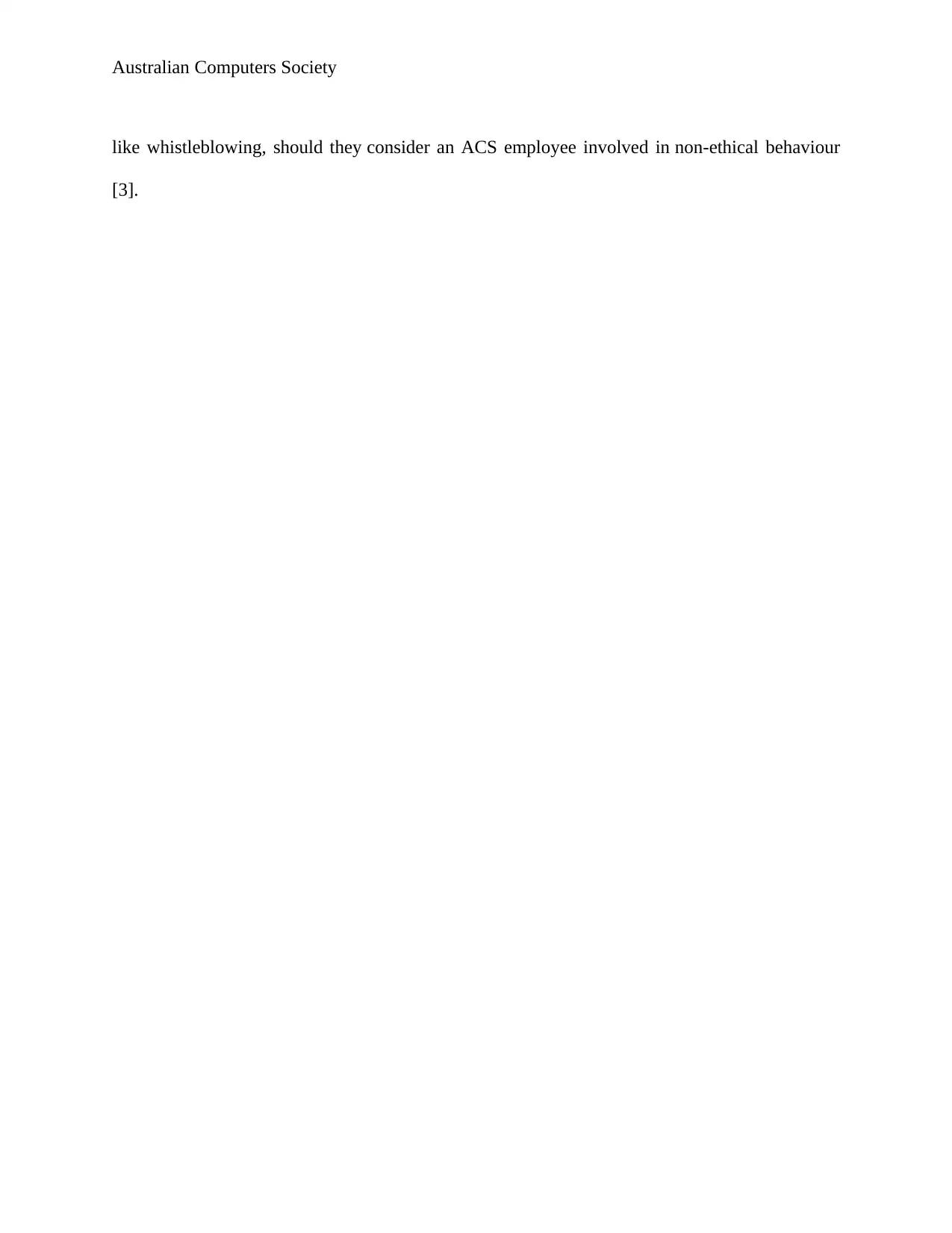
Australian Computers Society
like whistleblowing, should they consider an ACS employee involved in non-ethical behaviour
[3].
like whistleblowing, should they consider an ACS employee involved in non-ethical behaviour
[3].
Paraphrase This Document
Need a fresh take? Get an instant paraphrase of this document with our AI Paraphraser
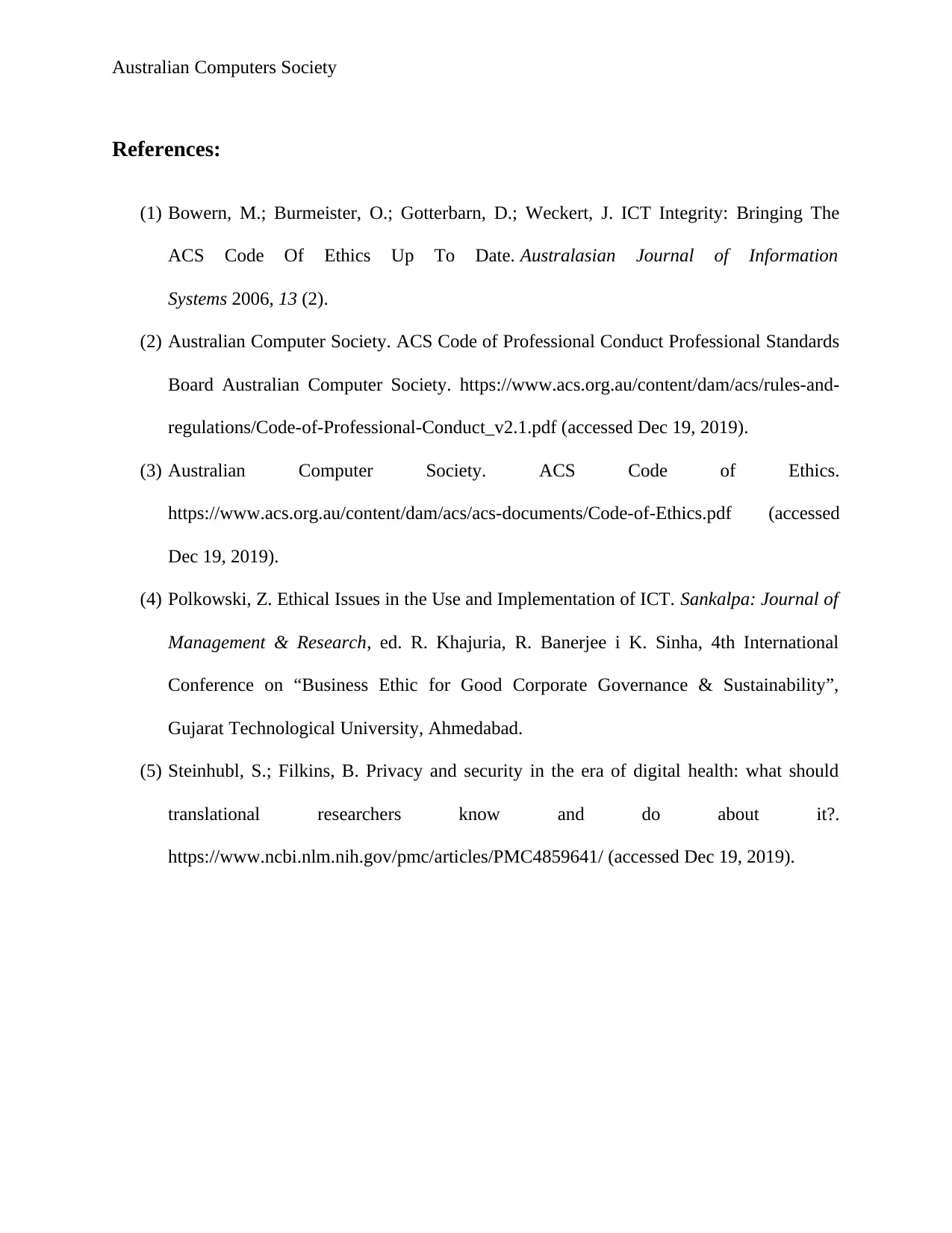
Australian Computers Society
References:
(1) Bowern, M.; Burmeister, O.; Gotterbarn, D.; Weckert, J. ICT Integrity: Bringing The
ACS Code Of Ethics Up To Date. Australasian Journal of Information
Systems 2006, 13 (2).
(2) Australian Computer Society. ACS Code of Professional Conduct Professional Standards
Board Australian Computer Society. https://www.acs.org.au/content/dam/acs/rules-and-
regulations/Code-of-Professional-Conduct_v2.1.pdf (accessed Dec 19, 2019).
(3) Australian Computer Society. ACS Code of Ethics.
https://www.acs.org.au/content/dam/acs/acs-documents/Code-of-Ethics.pdf (accessed
Dec 19, 2019).
(4) Polkowski, Z. Ethical Issues in the Use and Implementation of ICT. Sankalpa: Journal of
Management & Research, ed. R. Khajuria, R. Banerjee i K. Sinha, 4th International
Conference on “Business Ethic for Good Corporate Governance & Sustainability”,
Gujarat Technological University, Ahmedabad.
(5) Steinhubl, S.; Filkins, B. Privacy and security in the era of digital health: what should
translational researchers know and do about it?.
https://www.ncbi.nlm.nih.gov/pmc/articles/PMC4859641/ (accessed Dec 19, 2019).
References:
(1) Bowern, M.; Burmeister, O.; Gotterbarn, D.; Weckert, J. ICT Integrity: Bringing The
ACS Code Of Ethics Up To Date. Australasian Journal of Information
Systems 2006, 13 (2).
(2) Australian Computer Society. ACS Code of Professional Conduct Professional Standards
Board Australian Computer Society. https://www.acs.org.au/content/dam/acs/rules-and-
regulations/Code-of-Professional-Conduct_v2.1.pdf (accessed Dec 19, 2019).
(3) Australian Computer Society. ACS Code of Ethics.
https://www.acs.org.au/content/dam/acs/acs-documents/Code-of-Ethics.pdf (accessed
Dec 19, 2019).
(4) Polkowski, Z. Ethical Issues in the Use and Implementation of ICT. Sankalpa: Journal of
Management & Research, ed. R. Khajuria, R. Banerjee i K. Sinha, 4th International
Conference on “Business Ethic for Good Corporate Governance & Sustainability”,
Gujarat Technological University, Ahmedabad.
(5) Steinhubl, S.; Filkins, B. Privacy and security in the era of digital health: what should
translational researchers know and do about it?.
https://www.ncbi.nlm.nih.gov/pmc/articles/PMC4859641/ (accessed Dec 19, 2019).
1 out of 8
Related Documents
Your All-in-One AI-Powered Toolkit for Academic Success.
+13062052269
info@desklib.com
Available 24*7 on WhatsApp / Email
![[object Object]](/_next/static/media/star-bottom.7253800d.svg)
Unlock your academic potential
Copyright © 2020–2026 A2Z Services. All Rights Reserved. Developed and managed by ZUCOL.





